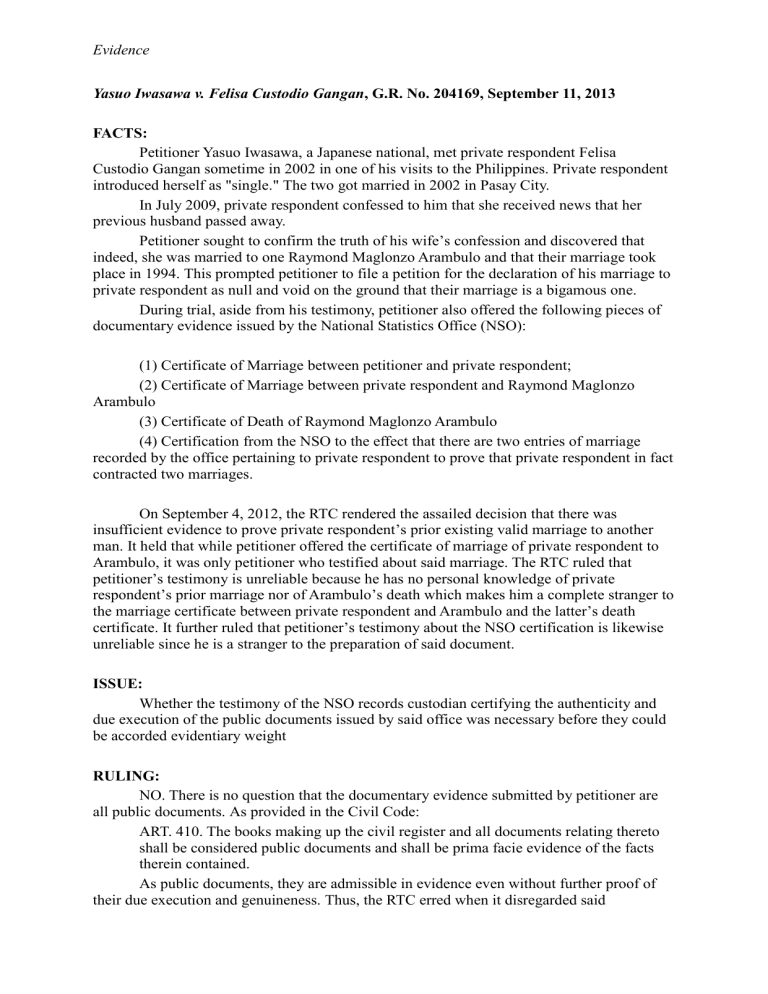
Evidence Yasuo Iwasawa v. Felisa Custodio Gangan, G.R. No. 204169, September 11, 2013 FACTS: Petitioner Yasuo Iwasawa, a Japanese national, met private respondent Felisa Custodio Gangan sometime in 2002 in one of his visits to the Philippines. Private respondent introduced herself as "single." The two got married in 2002 in Pasay City. In July 2009, private respondent confessed to him that she received news that her previous husband passed away. Petitioner sought to confirm the truth of his wife’s confession and discovered that indeed, she was married to one Raymond Maglonzo Arambulo and that their marriage took place in 1994. This prompted petitioner to file a petition for the declaration of his marriage to private respondent as null and void on the ground that their marriage is a bigamous one. During trial, aside from his testimony, petitioner also offered the following pieces of documentary evidence issued by the National Statistics Office (NSO): (1) Certificate of Marriage between petitioner and private respondent; (2) Certificate of Marriage between private respondent and Raymond Maglonzo Arambulo (3) Certificate of Death of Raymond Maglonzo Arambulo (4) Certification from the NSO to the effect that there are two entries of marriage recorded by the office pertaining to private respondent to prove that private respondent in fact contracted two marriages. On September 4, 2012, the RTC rendered the assailed decision that there was insufficient evidence to prove private respondent’s prior existing valid marriage to another man. It held that while petitioner offered the certificate of marriage of private respondent to Arambulo, it was only petitioner who testified about said marriage. The RTC ruled that petitioner’s testimony is unreliable because he has no personal knowledge of private respondent’s prior marriage nor of Arambulo’s death which makes him a complete stranger to the marriage certificate between private respondent and Arambulo and the latter’s death certificate. It further ruled that petitioner’s testimony about the NSO certification is likewise unreliable since he is a stranger to the preparation of said document. ISSUE: Whether the testimony of the NSO records custodian certifying the authenticity and due execution of the public documents issued by said office was necessary before they could be accorded evidentiary weight RULING: NO. There is no question that the documentary evidence submitted by petitioner are all public documents. As provided in the Civil Code: ART. 410. The books making up the civil register and all documents relating thereto shall be considered public documents and shall be prima facie evidence of the facts therein contained. As public documents, they are admissible in evidence even without further proof of their due execution and genuineness. Thus, the RTC erred when it disregarded said Evidence documents on the sole ground that the petitioner did not present the records custodian of the NSO who issued them to testify on their authenticity and due execution since proof of authenticity and due execution was not anymore necessary. Moreover, not only are said documents admissible, they deserve to be given evidentiary weight because they constitute prima facie evidence of the facts stated therein. And in the instant case, the facts stated therein remain unrebutted since neither the private respondent nor the public prosecutor presented evidence to the contrary.